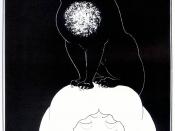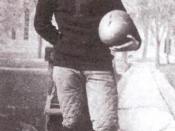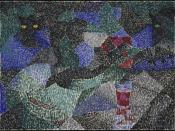In Edgar Allen Poe's "The Black Cat" the reader is told that the narrator appears to be a happily married man, who has always been exceedingly kind and gentle. He attributes his downfall to "the spirit of perverseness." This downfall is depicted in several heinous acts, such as when he curses at his wife and eventually "offered her personal violence." In a drunken stupor he took a pen knife from his jacket pocket and intentionally cut out one of Pluto's, a cat, eyes from the socket. Perverseness provides the rationale for otherwise what would have to be considered unjustifiable acts, such as killing the first cat or rapping with his cane upon the plastered-up wall behind which stood his wife's corpse. We might argue that what the narrator calls "perverseness" is actually referring to the conscience. Guilt about his alcoholism seems to the narrator the "perverseness" which causes him to maim and kill the first cat.
Guilt about those actions indirectly leads to the murder of his wife, who has shown him the gallows on the second cat's breast. In the beginning of the story, "The imp of the perverse" Poe allows the reader to realize that the narrator, in confessing his guilt after having successfully committing and getting away with a crime, has acted perversely in confessing. There was no reason for him to confess, other of course, than confessing was that which he should not do. Although Poe does not make any explicit claims to a connection between perversity and the conscience, I think it is strongly implied here as well.





